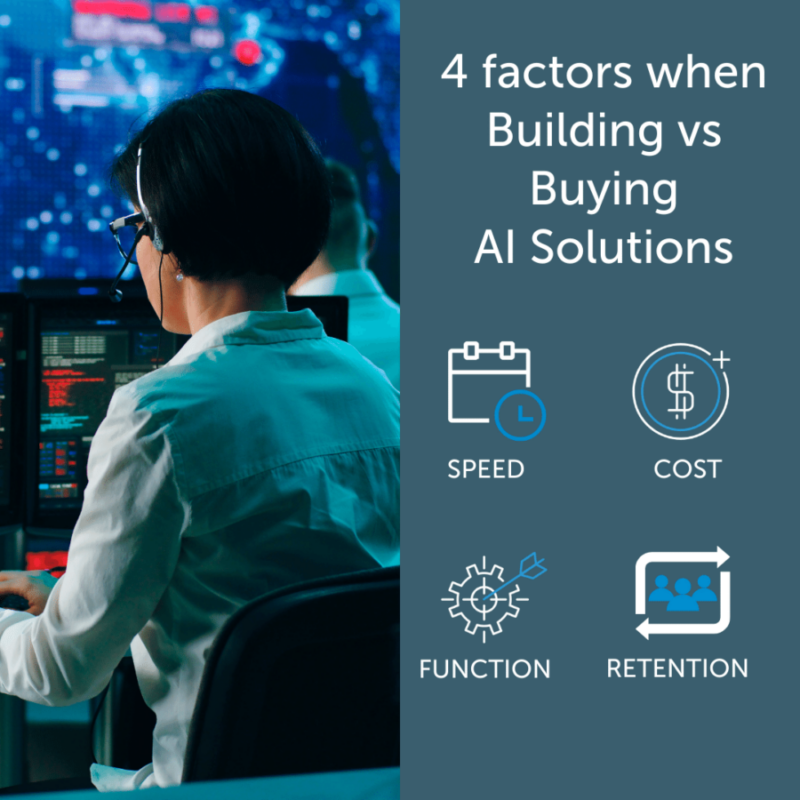Around the world, the emergence of increasingly sophisticated analytics, automation and artificial intelligence (AI) is transforming our personal and professional lives. With global spending on AI and other cognitive technologies expected to increase to US$52.2 billion per year by 2021, it’s difficult to imagine such transformative technology not being a part of every company’s future. One of the first questions faced by any organisation embarking on digital transformation is do we build it ourselves or outsource?
OPERATIONS STAFF ARE THE BEATING HEART OF DIGITAL TRANSFORMATION – OR THEY SHOULD BE
Innovation often starts as a buzzword for most companies. A CEO or COO suggests that digital transformation is needed. The operations team wholeheartedly agrees. After all, it’s their lives and their daily activities that will be dramatically improved by the introduction of digital tools, systems and processes. The hard-working staff in operations roles don’t really care much for board reports, new divisions, or Digital Innovation Officers – they just want solutions that work.
The question is almost always the same, no matter the industry or vertical – should we build a bespoke, custom solution internally or should be buy an existing no-code AI solution from an expert software as a service company? The difficulty lies in the fact that introducing transformative technology can very quickly take a turn for the worse, if not properly handled. Instead of being solutions focused, it becomes ‘let’s build a team’ – instead of ‘let’s build capability.’
There are many examples that illustrate how paralysing and damaging it can be when the wrong decision is made. We’ve seen it time and again. More often than not, the operations and maintenance teams have been ready and waiting to go for years. But instead of powering ahead and implementing a relevant and usable digital tool that will significantly assist their operations, many companies instead spend years building an internal data team, with lower expertise in the AI space and much slower implementation. As a result, they miss out on years of AI enabled tools that could have been saving them millions.
As in the above example, the issue lies in the divide that separates Operations and IT. Operations teams typically have KPIs strongly focused on safety, reliability and cost effectiveness. IT, on the other hand, get given a budget and their KPI is to spend it – to prove they needed it and convince executives they need the same, or larger, budget for next year. And of course, the higher the head count in the IT team, the more budget they need. And here we come up against the cardinal sin and biggest problem with the build vs buy decision – often priority is placed on building bigger IT teams, rather than finding better solutions.
Building a team to solve the complex problem of digital transformation can be fantastic. If fast moving change agents are given the power to enact rapid and sweeping changes across business processes, systems, tools and structures, the results can be incredible. The sad reality is though, that this isn’t often the case. If an existing tool exists that will solve 80% of your problem right away, isn’t that a much better approach?
It’s often difficult to know how to make the build vs buy decision, but below are some key factors worth considering when you do:
Still unsure what the best approach is for your organisation? We are more than happy to discuss your options, help you understand the data storage and no-code AI solutions that are available off-the shelf, and can be implemented in just weeks.

Dr Siavash shares insights into why asset failures are missed, and how AI helps Engineers see them earlier.
Read ArticleExplore three early signs of equipment deviation that are commonly missed — and how real‑time, multivariate AI models can help reliability teams detect, diagnose, and act.
Read ArticleInterested in a demo of one of our data solution products?
DataHUB4.0 is our enterprise data historian solution, OPUS is our Auto AI platform and OASIS is our remote control solution for Smart Cities and Facilities.
Book your demo with our team today!
Complete the form below and we’ll connect you with the right VROC expert to discuss your project. Whether you’re launching a pilot, scaling AI across your enterprise, or integrating complex systems, we’ll help you turn your data into actionable insights—fast, efficiently, and with confidence.
The efficient deployment, continuous retraining of models with live data and monitoring of model accuracy falls under the categorisation called MLOps. As businesses have hundreds and even.
Learn more about DataHUB+, VROC's enterprise data historian and visualization platform. Complete the form to download the product sheet.
Learn how OASIS unifies your systems, streams real-time data, and gives you full control of your smart facility—remotely and efficiently. Complete the form to access the product sheet.
Discover how OPUS, VROC’s no-code Industrial AI platform, turns your operational data into actionable insights. Complete the form below to access the product sheet and learn how you can predict failures, optimise processes, and accelerate AI adoption across your facility.
Interested in reading the technical case studies? Complete the form and our team will be in touch with you.
Subscribe to our newsletter for quarterly VROC updates and industry news.